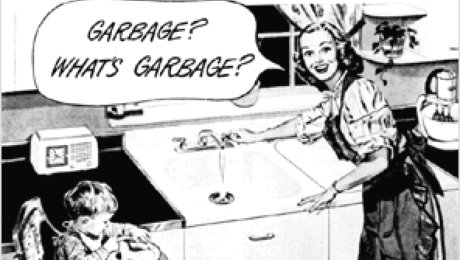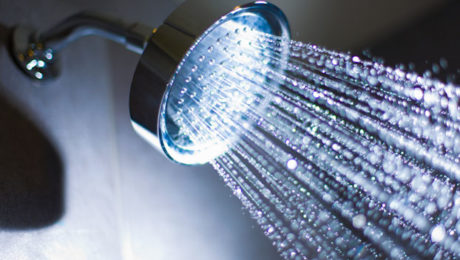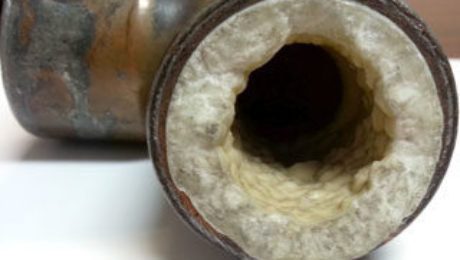6 Tips to Holiday-Proof Your Plumbing
Deck the halls, wrap the gifts and check your plumbing. Holiday gatherings bring good cheer, good food, and extra stress on your drains, garbage disposal and plumbing system. A few precautions can make all the difference, so take note and get ahead of the game.
1. Make sure you have mesh screens over your sink and tub drains. You never know what a little munchkin might drop into the sink or bath. (Not to mention the extra food and hair.)
2. Your garbage disposal can only do so much. The intention is not to absorb all of your food waste. Only put small scraps in the disposal, scrape the rest into the trash. Never put these foods down your garbage disposal: coffee grounds, meat, poultry, fish, beef or pork bones (chicken bones are okay), pasta, rice, bread, potatoes, fruit or vegetable peels. Have cold water running through the disposer the entire time you are using it, this keeps the food firm and it chops up better.
3. Don’t pour grease down the sink. This is bad on all levels— the disposal, the drain pipe, the smell…you get the picture.
4. Space out showers. If everyone waits until the last minute, someone’s getting a cold shower. Give your water heater time to re-heat the water in between. (Tip: Have some people bathe at night.)
5. Make sure your toilet isn’t continuously or randomly running. If it’s running and not being used, it could be a faulty rubber stopper. This is easy to change, and expensive if you don’t.
6. When all else fails, keep a drain snake and toilet plunger handy. Let’s face it, life happens and things can get messy.
- Published in Tips of the Trade
Take a Little (Water) Pressure Off
Yes, it’s nice having powerful water pressure for things such as dishwashers or showers, but the reality is, high water pressure puts extra strain on your pipes and can wreak havoc on your plumbing system—not to mention ceilings, walls and floors if a leak occurs. It also puts additional stress on appliances such as your washing machine and water heater. Over time, even pinhole leaks can cause expensive damage. Excessive force can cause pipe joints to break, valves to leak, and over time cause toilet parts to succumb.
High water pressure also wastes water, and what you may not know is that many municipalities not only charge for water consumption, but also for the disposal of wastewater. Reducing water consumption also reduces the excess energy needed to heat the additional water- hence, more money in your pocket.
There are a number of indications your pressure is too high. Typically you will hear banging somewhere in your pipes, or you may have leaks in fixtures that only appear intermittently, such as at night. Another indication is when toilets start running when they are not being used.
There are a few reasons your water pressure could be higher than needed. One of the major causes comes from the municipal water supplier, who can often set the pressure to meet their own needs such as delivering water to fire hydrants or high elevation buildings. These are often set over 100psi, and too often over 150psi. For a residential home, the maximum should be 80psi. Living at the bottom of a hill is another common reason for high water pressure.
Fortunately, the solution is simple. A water pressure reducing valve automatically reduces the pressure from the water supply to a slower, more sensible pressure. The valve is installed directly after the water meter and even if the supply water pressure fluctuates, the pressure reducing valve ensures a constant flow at the set pressure.
There are different types of valves, along with different installation configurations, so if you are inexperienced in plumbing, this is a job that is best left to a professional.
- Published in Tips of the Trade
Hard Water Fixes? Not Hard at All.
Where the term “hard water” originated is a bit uncertain. Some people say it’s from the minerals “hardening” on the surface, some say because it’s “hard” to clean, and others say it’s because it makes it “hard” to get soap to lather.
Whatever the origin, due to the amount of minerals, hard water has a big impact on day to day life. It can shorten the life span of clothes by up to 40%, dry out skin and hair, damage the functionality of appliances, leave spots of film on dishes, clog pipes, reduce water flow and can increase energy bills by up to 25%.
Don’t worry, it sounds like a daunting list, but with some maintenance, you can keep the damaging effects at bay and it becomes nothing more than a nuisance.
First, let’s talk about the problem. What causes hard water?
Hard water is contains calcium, magnesium and sometimes even iron. It is created when the water absorbs the minerals while passing through soft rock such as limestone. (And Florida’s land contains large amounts of limestone.)
Don’t fret, you have options.
Option 1: Purchase a water softening system.
These systems can eliminate the calcium and magnesium replacing them with a softer mineral like sodium or potassium. Systems will vary in cost depending on the size of your home, but if it’s financially viable, this option could double the life of your appliances.
Option 2: DIY
When it comes to do-it- yourself pipe and plumbing fixture cleaning, you can either use a commercial hydrochloric acid product (**Use with extreme care** Muriatic Acid is a weaker form of Hydrochloric Acid, however extreme care is still highly recommended.) or a natural cleanser of vinegar and baking soda. Both work well, however the commercial products can be expensive, and you don’t want to risk getting it into your potable water. (Also be sure to wear gloves and goggles while working.) The benefit to this method is that it only takes about 10-15 minutes and the instructions are pretty self explanatory. With a natural cleanser, it takes more time but is less expensive and as the name implies, is all natural. We’re going to give you the low-down on the natural method, but as we said, it’s a personal preference.
The Natural “How”
To clean fixtures:
Use one part white vinegar to 3 parts water. Dismantle removable parts and put to soak in vinegar solution. Use a toothbrush or other soft bristle to scrub calcium away. For the main fixtures, soak a soft cloth with the solution, then wipe the fixture to remove any flaking. Rinse cloth, re-soak in vinegar solution, then wrap around the fixture for 15 minutes. The rest of the deposits should clean away easily.
For Pipes:
For a 1,000 sq. foot home, you will need 2-3 gallons white vinegar and 1 cup baking soda per drain.
Fill a large pot of water for each drain. Shut off all taps, including any outdoor faucets. Put 1 coup of baking soda down each drain and slowly pour in the vinegar, (as much as the sink will hold,) it should bubble and fizz. This solution should sit for about 3-4 hours. 30 minutes before the solution is ready to drain, boil the pots of water. When ready, pour down the drains quickly and forcefully, which will dissolve grease and soap and help sanitize. Open the faucets one by one at full blast. You may see calcium and limestone chunks, which is normal. Some of the residue may be powdery and stuck at the bottom of the pipes. It’s a good idea to open the drain pipes and clean out the p-traps.
Just remember, it’s not rocket science, but it is important not to let it go too long or you may end up replacing pipes.
- Published in Tips of the Trade



